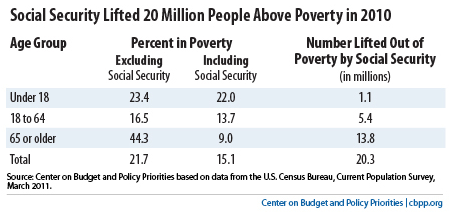
On August 14, 1935, President Franklin D. Roosevelt, Democrat, signed the Social Security Act into law. Since that time, Social Security has been protected by Democratic presidents and Democratic Congresses.

FDR signing Social Security into law
The Social Security Act of 1935:
Before the 1930s, support for the elderly was a matter of local, state and family rather than a Federal concern (except for veterans’ pensions). However, the widespread suffering caused by the Great Depression brought support for numerous proposals for a national old-age insurance system. On January 17, 1935, President Franklin D. Roosevelt sent a message to Congress asking for “social security” legislation.
The act created a uniquely American solution to the problem of old-age pensions. Unlike many European nations, U.S. social security “insurance” was supported from “contributions” in the form of taxes on individuals’ wages and employers’ payrolls rather than directly from Government funds. The act also provided funds to assist children, the blind, and the unemployed; to institute vocational training programs; and provide family health programs.
Prior to Social Security, the elderly routinely faced the prospect of poverty upon retirement. For the most part, that fear has now dissipated.
Franklin D. Roosevelt, Democratic president, created a long-lasting program to keep our most vulnerable citizens out of poverty.
Franklin D. Roosevelt speaking on August 14, 1935:
Today, a hope of many years’ standing is in large part fulfilled.
The civilization of the past hundred years, with its startling industrial changes, had tended more and more to make life insecure.
Young people have come to wonder what will be there lot when they came to old age.
The man with a job has wondered how long the job would last.
This social security measure gives at least some protection to 50 millions of our citizens who will reap direct benefits through unemployment compensation, through old-age pensions, and through increased services for the protection of children and the prevention of ill health.
We can never insure 100 percent of the population against 100 percent of the hazards and vicissitudes of life, but we have tried to frame a law which will give some measure of protection to the average citizen and to his family against the loss of a job and against poverty-stricken old age.
This law, too, represents a cornerstone in a structure which is being built but is by no means complete. It is a structure intended to lessen the force of possible future depressions. It will act as a protection to future administrations against the necessity of going deeply into debt to furnish relief to the needy. The law will flatten out the peaks and valleys of deflation and of inflation. It is, in short, a law that will take care of human needs and at the same time provide the United States an economic structure of vastly greater soundness.
I congratulate all of you ladies and gentlemen, all of you in the Congress, in the executive departments and all of you who come from private life, and I thank you for your splendid efforts in behalf of this sound, needed and patriotic legislation.
It seems to me that if the Senate and the House of Representatives, in this long and arduous session, had done nothing more than pass this security Bill, Social Security Act, the session would be regarded as historic for all time.
Today, as this table from the Center on Budget and Policy Priorities shows, Social Security is keeping more than 20 million Americans out of poverty.
As CBPP’s Kathy Ruffing noted, Social Security is “the single most important source of income for its elderly beneficiaries, contributing on average two-thirds of income for recipients over age 65. For more than one-third of them, Social Security constitutes 90 percent or more of income…Without Social Security, nearly half of elderly Americans would live below the official poverty level; instead, fewer than 10 percent do.”
Five years ago: Weekly Address, August 14, 2010, President Barack Obama:
Seventy-five years ago today, in the midst of the Great Depression, Franklin Roosevelt signed Social Security into law, laying a cornerstone in the foundation of America’s middle class, and assuring generations of America’s seniors that after a lifetime of hard work, they’d have a chance to retire with dignity. We have an obligation to keep that promise; to safeguard Social Security for our seniors, people with disabilities, and all Americans – today, tomorrow, and forever.
Now, we’ve been talking for a long time about how to do that; about how to make sure Social Security is healthy enough to cover the higher costs that are kicking in now that baby boomers are retiring. And I’m committed to working with anyone, Democrat or Republican, who wants to strengthen Social Security. […]
One thing we can’t afford to do though is privatize Social Security – an ill-conceived idea that would add trillions of dollars to our budget deficit while tying your benefits to the whims of Wall Street traders and the ups and downs of the stock market.
A few years ago, we had a debate about privatizing Social Security. And I’d have thought that debate would’ve been put to rest once and for all by the financial crisis we’ve just experienced. I’d have thought, after being reminded how quickly the stock market can tumble, after seeing the wealth people worked a lifetime to earn wiped out in a matter of days, that no one would want to place bets with Social Security on Wall Street; that everyone would understand why we need to be prudent about investing the retirement money of tens of millions of Americans.
Seventy-five years ago today, Franklin Roosevelt made a promise. He promised that from that day forward, we’d offer – quote – “some measure of protection to the average citizen and to his family against poverty-stricken old age.” That’s a promise each generation of Americans has kept. And it’s a promise America will continue to keep so long as I have the honor of serving as President
That is a promise that each generation should keep and has kept up until the present day. But it is not a promise that Republicans are making … it is a promise that only Democrats are making.
White House statement on seniors and social security:
“To put us on solid ground, we should also find a bipartisan solution to strengthen Social Security for future generations. We must do it without putting at risk current retirees, the most vulnerable, or people with disabilities; without slashing benefits for future generations; and without subjecting Americans’ guaranteed retirement income to the whims of the stock market.”
-President Barack Obama in the State of the Union Address, January 25, 2011
 Vice President Joe Biden speaking to cafe patrons in Virginia in 2012y: Vice President Joe Biden speaking to cafe patrons in Virginia in 2012y:
|
 House Minority Leader Nancy Pelosi on the 77th Anniversary of the signing: House Minority Leader Nancy Pelosi on the 77th Anniversary of the signing:
|
The Social Security Act was created by a Democratic president and a Democratic Congress. Since its inception, Republicans have been trying to weaken and destroy this basic safety net for our senior citizens while Democrats have been working to protect and strengthen it.
In 2016, it will again become an issue as most of the declared candidates for the Republican Party nomination have taken aim that Social Security.
Tell them, no … hands off our Social Security.
~~
(A version of this post was originally published as part of a series leading up to the 2012 election called I Vote For Democrats)


Notice a pattern?



And am sure that every American WANTS it.
Of course they do! And the scaremongering Republicans trying to turn older Americans against younger Americans by telling the folks currently collecting Social Security that the fund will run dry any day now are the worst of the worst. There is a permanent fix to the Social Security trust fund that was proposed back in 2008 (PDF). But the Republicans keep hoping that they can repeal Social Security’s promise and they won’t give up as long as they are a national party. I might suggest that there is a permanent fix for that!
Thanks for this post, Jan. I think the Social Security benefit should be raised, not lowered! And the age for taking benefits should remain at 62. Not everyone is an overfed, overpaid journo sitting in front of a screen all day. Some people actually work—bricklayers, short-order cooks, waitresses, street cleaners, all those people who do the “invisible” jobs, the absence of which we’d all notice very quickly. I am unceasingly grateful for my Social Security benefits, which constitute half my monthly income.
So cheers to FDR and jeers to the Rethugs! What part of the Wall Street crash of 2008 did they forget about?
Exactly! Yesterday, my right-wing rag published an editorial that was penned by a guy sitting on his duff in an air conditioned office with a cup of coffee and a secretary to do all the heavy lifting. It suggested that Social Security can only be fixed by raising the retirement age to 69, the policy position of another guy who sits on his (not insubstantial) duff in an air conditioned office all day, Gov. Christie of New Jersey. And to add insult to injury, they point to a study by the Concord Coalition, a group of men who also sit on the duffs all day, concern trolling that the fund will run out of money soon and cuts to benefits is the only solution. They are wrong, we can raise the cap and extend solvency through 2075. I think I see where they are going with their plan: a retirement age of 69 will guarantee that fewer workers will live to collect it. Many people who have been working for the past 45 years in a factory doing back breaking work are just hoping and praying to get to 65 so that they can give their bodies a rest.
The Republicans want to scare the little old ladies into thinking that Social Security is broke so that they can kill Social Security once and for all:
If the little old ladies REALLY want to guarantee the solvency of the fund, they will vote for Democrats … the only party that wants to keep our elderly out of poverty.
